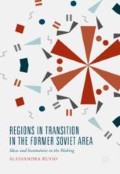Abstract
This chapter provides an overview of the rationales and motivations behind the research project as a whole. Specifically, this project examines regional dynamics inside the former Soviet space by observing the structuration of a region, how it relates to states and other processes of polity-making, and to what extent “the regionals”—i.e., all the various regionally-scaled articulations of political units—unfold through this dialectics.
Access this chapter
Tax calculation will be finalised at checkout
Purchases are for personal use only
References
Acharya Amitav. “International Relations and Area Studies: Towards a New Synthesis?”. Institute of Defence and Strategic Studies, Nanyang Technological University, Singapore, 2006.
Amin Samir. “Regionalisation in Response to Polarizing Globalization”. In Globalism and the New Regionalism, edited by Björn Hettne, Andras Inotai and Osvaldo Sunkel. London: Macmillan, 1999, pp. 54–84.
Bach Daniel. “New Regionalism as an Alias: Regionalisation through Trans-State Networks”. In New Regionalism in Africa, edited by Andrew Grant and Fredrik Soderbaum. Aldershot: Ashgate, 2003, pp. 21–30.
Bartolini Stefano. Restructuring Europe. Oxford: Oxford University Press, 2005.
Bude Heinz. “The Art of Interpretation”. In A Companion to Qualitative Research, edited by Uwe Flick, Ernst von Kardoff, Ines Steinke. Thousand Oaks, CA: Sage, 2004, pp. 321–325.
Buzan Barry. “How regions were made, and the legacies for world politics”. In International Relations Theory and Regional Transformation, edited by T.V. Paul. Cambridge: Cambridge University Press, 2012, pp. 22–46.
Collins Kathleen. “Economic and Security Regionalism among Patrimonial Authoritarian Regimes: The Case of Central Asia”. Europe-Asia Studies, Vol. 61, No. 2, 2009, pp. 251–283.
De Lombaerde Philippe, Fredrik Soderbaum, Luk Van Langenhove and Francis Baert. “Problems and Divides in Comparative Regionalism”. In Comparative Regional Integration: Europe and Beyond, edited by Finn Laursen. Farnham: Ashgate, 2010.
Dubnov Arkady. “Divorce of Convenience”. Vremya Novostei, 24 August 2005a. In Current Digest of the Post-Soviet Press, Vol. 57, No. 35.
Dubnov Arkady. “The CIS: surviving until the Minsk summit”. Vremya Novostei, 29 August 2005b. In Current Digest of the Post-Soviet Press, Vol. 57, No. 35.
Friedrichs Jörg and Friedrich Kratochwil. “On Acting and Knowing: How Pragmatism Can Advance International Relations Research and Methodology”. International Organization, Vol. 63, No. 4, 2009, pp. 701–731.
Gamlova Svetlana and Sokhbet Mamedov. “CIS Approaching Half-Life”. Nezavisimay Gazeta, 17 August 2011. In Current Digest of the Post-Soviet Press, Vol. 63, No. 33.
Glumskov Dmitry, Yury Chenogayev, Emin Khurrami, Vladimir Novikov, Boris Volkhonsnky. “Whole Region Drops Out of Commonwealth”. Kommersant, 28 January 2003. In Current Digest of the Post-Soviet Press, Vol. 55 No. 4.
Hameiri Shahar. “Theorising regions through changes in statehood: rethinking the theory and method of comparative regionalism”. Review of International Studies, Vol. 39, No. 2, 2013, pp. 313–335.
Jupille Joseph and Brandy Jolliff. “Method, Model and Mentor: The EU as Promoter of Regional Integration”. Paper presented at the conference “The Diffusion of Regional Integration”, Berlin: Kolleg-Forschergruppe “The Transformative Power of Europe”, 10–11 December 2010.
Kembayev Zhenis. Legal Aspects of the Regional Integration Processes in the Post-Soviet Area. Berlin: Springer, 2009.
Kennedy Michael. “A Manifesto (of sorts) for Area Studies”. The Journal of International Institute, Vol. 4, No. 3, 1997, http://hdl.handle.net/2027/spo.4750978.0004.302.
Libman Alexander. “Regionalisation and regionalism in the post-Soviet space: Current status and implications for institutional development”. Europe-Asia Studies, Vol. 59, No. 3, 2007, pp. 401–430.
Libman Alexander and Evgeny Vinokurov. “Post-Soviet integration and the interaction of functional bureaucracies”. Review of International Political Economy, Vol. 19, No. 5, 2012, pp. 867–894.
Malamud Andrés. “Presidentialism and Mercosur: A Hidden Cause for A Successful Experience”. In Comparative Regional Integration: Theoretical Perspectives, edited by Finn Laursen. Aldershot: Ashgate, 2003, pp. 53–73.
Matveeva Anna. “The Regionalist Project in Central Asia: Unwilling Playmates”. Crisis States Working Papers Series 2, Working Paper 13, London: London School of Economics, Crisis States Research Centre, 2007.
Melikova Natalya Mikhailova. “CIS Funeral in Yerevan”. Nezavisimaya Gazeta, 28 March 2005. In Current Digest of the Post-Soviet Press, Vol. 57 No. 13.
Nazarbayev Nursultan. “Eurasian Union: From Idea to Future History”. Izvestia, 26 October 2011. In Current Digest of Post-Soviet Press, Vol. 63, No. 43.
Postel-Vinay Karoline. “The Historicity of the International Region: Revisiting the ‘Europe and the Rest’ Divide”. Geopolitics, Vol. 12, No. 4, 2007, pp. 555–569.
Postel-Vinay Karoline. “Creating International Regions: the Spatial Expression of Power”. In Regional Powers and Regional Orders, edited by Nadine Godehardt and Dirk Nabers, Abingdon: Routledge, 2011, pp. 21–32.
Ratiani Natalya. “CIS will either get stronger or erode”. Izvestia, 20 July 2004. In Current Digest of the Post-Soviet Press, Vol. 56 No. 29.
Reichertz Jo. “Abduction, Deduction and Induction in Qualitative Research”. In A Companion to Qualitative Research, edited by Uwe Flick, Ernst von Kardoff, Ines Steinke. Thousand Oaks, CA: Sage, 2004, pp. 159–164.
Söderbaum Fredrik. The Political Economy of Regionalism. The Case of Southern Africa. London: Palgrave Macmillan, 2004.
Solingen Etel. Regional Orders at Century’s Dawn: Global and Domestic Influences on Grand Strategy. Princeton, NJ: Princeton University Press, 1998.
Teti Andrea. “Bridging the Gap: IR, Middle East Studies and the Disciplinary Politics of the Area Studies Controversy”. European Journal of International Relations, Vol. 13, No. 1, 2007, pp. 117–145.
Vabulas Felicity and Duncan Snidal. “Organization without Delegation: Informal Intergovernmental Organizations (IIGOs) and the Spectrum of Intergovernmental Arrangements”. The Review of International Organizations, Vol. 8, No. 2, 2013, pp. 193–220.
Wendt Alexander. “On constitution and causation in IR”. Review of International Studies, Vol. 24, No. 5, 1998, pp. 101–118.
Zatulin Konstantin and Andranik Migranyan. “The CIS after Chisinau, Sodruzhevstvo”. Supplement to Nezavisimaya Gazeta No. 1, December 1997. In Current Digest of the Post-Soviet Press, Vol. 49 No. 50.
Author information
Authors and Affiliations
Rights and permissions
Copyright information
© 2018 The Author(s)
About this chapter
Cite this chapter
Russo, A. (2018). Introduction. In: Regions in Transition in the Former Soviet Area. Palgrave Macmillan, Cham. https://doi.org/10.1007/978-3-319-60624-8_1
Download citation
DOI: https://doi.org/10.1007/978-3-319-60624-8_1
Published:
Publisher Name: Palgrave Macmillan, Cham
Print ISBN: 978-3-319-60623-1
Online ISBN: 978-3-319-60624-8
eBook Packages: Political Science and International StudiesPolitical Science and International Studies (R0)

